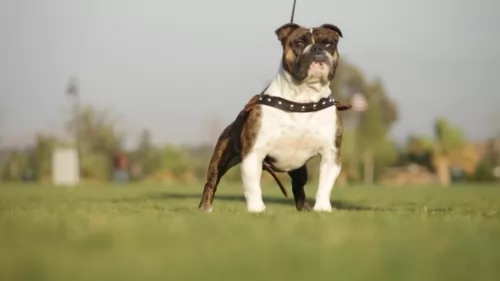 Petzlover
Petzlover Bantam Bulldog is originated from United Kingdom but Morkie is originated from United States. Bantam Bulldog may grow 6 cm / 3 inches higher than Morkie. Bantam Bulldog may weigh 14 kg / 31 pounds more than Morkie. Both Bantam Bulldog and Morkie has almost same life span. Both Bantam Bulldog and Morkie has almost same litter size. Both Bantam Bulldog and Morkie requires Low Maintenance.
Bantam Bulldog is originated from United Kingdom but Morkie is originated from United States. Bantam Bulldog may grow 6 cm / 3 inches higher than Morkie. Bantam Bulldog may weigh 14 kg / 31 pounds more than Morkie. Both Bantam Bulldog and Morkie has almost same life span. Both Bantam Bulldog and Morkie has almost same litter size. Both Bantam Bulldog and Morkie requires Low Maintenance.
 The origin of the Bantam Bulldog goes back to the 1800s, and in fact there is evidence of miniature bull dogs in 1899, In 1902 the smaller bulldog breed was facing extinction, so that it became necessary to import French bulldogs to England to help restore the bantam bulldog breed.
The origin of the Bantam Bulldog goes back to the 1800s, and in fact there is evidence of miniature bull dogs in 1899, In 1902 the smaller bulldog breed was facing extinction, so that it became necessary to import French bulldogs to England to help restore the bantam bulldog breed.
It was only in 2002 that the United Canine Association recognized the English bantam bulldog.
They’re the same as the ordinary bulldog except they are lighter and shorter, although there are slightly larger ones which are as tall as a regular bulldog.
The Bantam bulldogge is related to the English and French bulldogs so that the standards for the bantam breed has similarities to both types.
 These cute little dogs originated in the United States. As a cross between a Maltese Poodle and Yorkshire Terrier, the idea of breeders was to bring out a gorgeous looking little dog that would be low shedding.
These cute little dogs originated in the United States. As a cross between a Maltese Poodle and Yorkshire Terrier, the idea of breeders was to bring out a gorgeous looking little dog that would be low shedding.
The Morkie Poo inherits this low shedding characteristic from the poodle side of things. It is not precisely clear as to when the first Morkie was born, but these days he is as popular as ever.
Certainly, both the parent breeds are recognized with kennel clubs but the Morkie isn’t.
 The breed has its origins with the English bulldog, but it was in 2011 that the ‘English’ was abandoned and the name of the dog changed to Bantam Bulldogge. Short to medium in height, and with his large, square head and broad, short muzzle, the dog is short, strong, stout and compact. He had wide apart eyes, short, half-pricked, half-floppy ears and the front legs are also strong and set wide apart.
The breed has its origins with the English bulldog, but it was in 2011 that the ‘English’ was abandoned and the name of the dog changed to Bantam Bulldogge. Short to medium in height, and with his large, square head and broad, short muzzle, the dog is short, strong, stout and compact. He had wide apart eyes, short, half-pricked, half-floppy ears and the front legs are also strong and set wide apart.
He is fit and active with a playful, jovial personality. The Bantam Bulldog is completely at ease with his human family and welcomes visitors to the home. He forms strong bonds with everyone in the family and loves the presence of children in the home too. As with most other dog breeds, he does well with training and socialization – it just makes him a better dog all round. He doesn’t have a problem with accepting other pets in the home.
The coat of the Bantam is short, dense and straight with the skin being tight to the body but looser around the head and neck. Both head and face have moderate wrinkles. The coat is available in all colors and is low maintenance. A good brush twice a week won’t only remove loose hairs and keep his short coat glossy, the mere act of brushing him strengthens the bond between you as well.
 The small Morkie is a crossbreed, and this means you can’t be 100% guaranteed of the dog’s looks. They usually stand at about 24 – 30cm in height and weigh between 4 and 6kg.
The small Morkie is a crossbreed, and this means you can’t be 100% guaranteed of the dog’s looks. They usually stand at about 24 – 30cm in height and weigh between 4 and 6kg.
You also get the Teacup Morkie which is even smaller. The coat of the Morkie can become fairly long and is black, brown and tan.
This is a little crossbreed dog who simply loves spending time with his human family. He is loving and gentle and will get along well with other pets in the home as well as with children.
Some people are inclined to think that these little balls of fluff are a total walkover, but don’t be mistaken, as these cheeky, feisty dogs have attitude. They’re social and playful and love to be involved in games with the kids. Just make sure your children have been taught how to be gentle with a small dog like this.
He becomes very attached to his family and doesn’t want to be left alone for too long.
 The Bantam Bulldog is full of personality and is active, friendly and social. He is an adaptable pet and will happily live with his human family in an apartment or in a home with a garden. Patient and tolerant, he responds well to the voice of his owner and simple commands are no problem with him as he is quick to learn and to please.
The Bantam Bulldog is full of personality and is active, friendly and social. He is an adaptable pet and will happily live with his human family in an apartment or in a home with a garden. Patient and tolerant, he responds well to the voice of his owner and simple commands are no problem with him as he is quick to learn and to please.
He is never going to be much of a guard dog for you, but he will be a happy, contented, loyal and devoted companion who just wants to be as close to you as he can.
 Your Morkie is such a sweet dog, and that’s to be expected, coming from such sweet parent breeds.
Your Morkie is such a sweet dog, and that’s to be expected, coming from such sweet parent breeds.
He just loves his human family and is friendly and social as well as being loyal. He has quite a bit of attitude, and if you allow it, he’ll develop some horrible small dog syndrome characteristics, such as being snappy, whiny and barking.
Small though he is, training and socialization will do him the world of good and he then lives up to everything wonderful that Morkie dog owners have got to tell you about– playful, friendly fun-loving, jaunty, loving and the cutest little thing there is.
 A happy dog is a healthy dog, but the happy Bantam Bulldog will be prone to certain ailments that are common to his breed
A happy dog is a healthy dog, but the happy Bantam Bulldog will be prone to certain ailments that are common to his breed
This breed of dog is prone to have hip dysplasia. Because of their genetic make-up, the soft tissues surrounding the joint develop abnormally and the disease can affect one- or both hips.
Bulldogs can also be prone to digestion issues which amounts to flatulence. This problem however, can be reduced significantly by giving your pet the best diet. Speak to your vet about appropriate foods for dogs with a sensitive stomach. With a sensitive stomach, you want to avoid dog foods with toxic colorants, artificial preservatives and artificial flavors.
Be aware of breathing problems with your bantam bulldog because flat-faced dog breeds such as this can battle with upper airway problems. Symptoms of an obstructed upper airway can include noisy breathing, panting, snoring, rapid breathing and coughing.
 As a responsible dog owner it is to your benefit to be aware of some of the common dog illnesses that your Morkie can succumb too. Not that he is likely too, as with good care, these robust little dogs can live to be 15 years of age or so.
As a responsible dog owner it is to your benefit to be aware of some of the common dog illnesses that your Morkie can succumb too. Not that he is likely too, as with good care, these robust little dogs can live to be 15 years of age or so.
A dog's lifespan can certainly be impacted by the lifestyle they lead. Some of the common dog illnesses to look out for -
Parvo can be a killer, and that’s why your 8 week old puppy needs to have his parvo vaccination. You’ll find puppies in shelters and puppy mills that get parvo. Dogs contact parvo by coming into contact with an infected dog.
Symptoms include vomiting, diarrhea, lethargy and weight loss. Quick medical treatment can save your dog but it is better to ensure he doesn't get it in the first place. Other diseases that require vaccinations are hepatitis, distemper and rabies.
This is a tick-borne illness brought on by bacteria transmitted by deer ticks that attach to the dog. One of the symptoms is lameness in limbs and a loss of appetite. Without treatment, lyme disease can lead to kidney problems.
Prevent your dog getting bloat by ensuring he doesn’t get ravenous with one meal a day. He then wants to wolf his food down. Rather give him smaller meals that he eats slower to avoid bloat. The stomach swells and can actually twist. If your dog has an enlarged stomach, is restless, salivating and wanting to vomit, get him to the vet immediately.
 Your Bantam Bulldog needs a lot of protein in his diet. In fact, the Association of American Feed Control Officials have suggested that the dog needs at least 22% of maintenance protein for puppies and 18% of protein for adult dogs. Speak to your vet about wet- and dry dog foods and which foods will suit this particular pet of yours. Always ensure cool, fresh water is within your pet’s reach.
Your Bantam Bulldog needs a lot of protein in his diet. In fact, the Association of American Feed Control Officials have suggested that the dog needs at least 22% of maintenance protein for puppies and 18% of protein for adult dogs. Speak to your vet about wet- and dry dog foods and which foods will suit this particular pet of yours. Always ensure cool, fresh water is within your pet’s reach.
The exercise needs of the Bantam Bulldog are minimal. He is never going to turn down a game of ball with the kids but you don’t have to take him on long walks or runs. He is a social pet, so even though you don’t have to be putting him through an exercise program every day, he doesn’t want to be left alone hour after hour, day after day.
 The Morkie is such a small dog so it won’t require much effort to brush him. Because the hair is thin and fine, you may want to brush him every day just to keep the silky hair from matting.
The Morkie is such a small dog so it won’t require much effort to brush him. Because the hair is thin and fine, you may want to brush him every day just to keep the silky hair from matting.
Many Morkie owners opt to have their Morkie’s trimmed at a professional dog parlor. Check around his eyes and check inside his ears to make sure both are clean and free from infection.
Little dogs always have trouble with their teeth, so make sure to check these regularly. Keep his nails trimmed too as if they grow long they can hook onto things and can cause injury.
The Morkie is an energetic little dog, but because he is small he isn’t going to require too much exercise. A walk now and then will delight him and some ball games indoors or outside. He is a dog that will settle happily into city- or country life, so long as he is with his beloved owner.
Morkies love their food and they can tend to gobble it up. Rather give your Morkie smaller meals than one main meal as he wolfs it down, causing digestive problems.
If you feed him kibble, make sure the packaging is marked for little dogs and make sure its the best there is to ensure he gets the right amount of minerals and vitamins in.
As a treat boil some chicken, brown rice, pasta and vegetables and chop it up very finely and add it into his kibble from time to time.
Make sure your Morkie can easily reach his bowl of fresh, cool water.